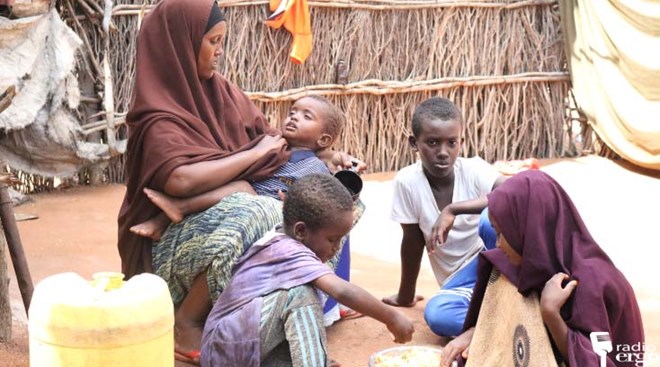
Wednesday November 6, 2019

A widow and her children from an ethnic minority, who fled Mogadishu for their safety following the high profile public killing of her husband over a family marriage dispute, is living without assistance in Kenya’s Dadaab refugee camp.
Farhiya Ahmed Qassim arrived in Dadaab with her two daughters and three sons in July, after neighbours in Mogadishu raised $1,200 for them to make the 10-day journey over the border to escape a barrage of death threats.
Farhiya’s husband, Ahmed Mukhtar Salah, was burned alive in Mogadishu in September 2018, after his nephew eloped and married a young woman from a powerful majority clan. Farhiya’s family are from the marginalized Bantu community, who have long suffered discrimination in Somalia. The brides’ family fiercely opposed the marriage.
The story made headlines at the time. The Mogadishu authorities stepped in to provide protection for the young newlyweds, but the rest of the family was forgotten and continued to suffer threats of violence.
Farhiya has been unable to register as a refugee, however, because the Kenyan government has put a stop to the registration of new arrivals. Kenya is committed to closing the camps and ensuring that all refugees return to Somalia.
Farhiya said she received constant death threats from relatives of the bride’s family that made their lives in Mogadishu impossible.
“They used to call us and threaten that they would kill all of us, they knew my phone number. I lived in fear and so we later decided to flee,” she said.
“When we arrived in the refugee camp, life became quickly unbearable because we had nothing to eat and could not get a food ration card.
Even if we had got the lentils that are distributed by the UN it would have been a relief,” she told Radio Ergo.
The camp leaders helped the family to meet with officials from the UN refugee agency, UNHCR, who informed them there was no ongoing registration. Farhiya said she was told by camp leaders that she could get preliminary registration by UNHCR in December.
Mukhtar Salah Oday, Farhiya’s 75-year-old father-in-law, moved with the family to Dadaab. He told Radio Ergo that he went blind as a result of grief on hearing the news of his son’s death.
Mukhtar said he had hoped for support in the refugee camp, but they had neither food nor shelter.
“You can imagine, an old man who lost the son who was supporting him financially. My son was a good man who was well known in Mogadishu and many other places,” said Mukthar. “He was responsible for his families and our family. I cannot sleep, I stay up because I cannot bear the loss of my son, I still have nightmares.”
Farhiya and her children survive on small amounts of food given to them by local clerics at a nearby mosque. Despite the hardship, she said they cannot go back to Mogadishu because they fear for their lives.
Ahmed left behind three widows and 17 children. The other two widows and their five sons and seven daughters are still hiding in Mogadishu, according to Farhiya.
Seven people including the bride’s mother were arrested over Ahmed’s brutal public murder. Two of the bride’s brothers and a maternal aunt were given death sentences in March and are still in prison.